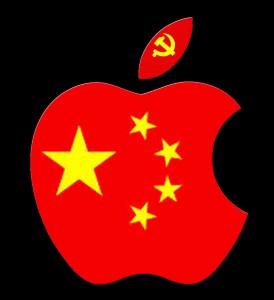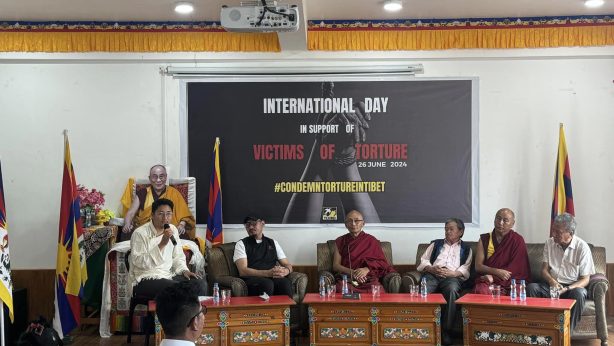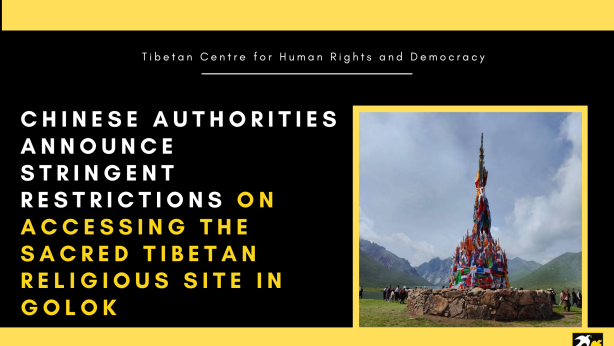Apple: Respect human rights or withdraw from China
 Recent reports that Apple’s suppliers have discriminated against Tibetans and other ethnic minorities in the People’s Republic of China demonstrate that the systematic and brutal discrimination by the Chinese government also exists in the private sector. Chinese policies in Tibet subject Tibetans to religious persecution, forced displacement, arbitrary detention, torture, and murder. Apple attempted to invest in China while still protecting and promoting human rights.
Recent reports that Apple’s suppliers have discriminated against Tibetans and other ethnic minorities in the People’s Republic of China demonstrate that the systematic and brutal discrimination by the Chinese government also exists in the private sector. Chinese policies in Tibet subject Tibetans to religious persecution, forced displacement, arbitrary detention, torture, and murder. Apple attempted to invest in China while still protecting and promoting human rights.
Apple is not the first corporation to invest in a discriminatory country while still trying to protect and promote human rights. In 1977, Reverend Leon Sullivan, a General Motors board member, created the Sullivan Principles. The Sullivan Principles originally consisted of six voluntary principles for multinational corporations in South Africa to follow. The principles called on corporations to adopt equal employment practices, desegregate the workplace, promote trade unions, and provide training and social services for black workers. In 1984, Sullivan also called upon corporations to use their influence to encourage South African corporations to adopt similar principles, to support the right of blacks to locate business in urban area, and support blacks violating apartheid laws by using services such as schools and transportation. By 1986, some 160 of the 244 American corporations in South Africa adopted the Sullivan Principles. In 1987, Sullivan called on corporations to disinvest and withdraw from South Africa—100 did. Three years later, international and domestic pressure forced the apartheid regime to the negotiating table and four years after that in 1994, Nelson Mandela was elected president.
The case of the Sullivan Principles can be illustrative for Apple. They were designed to promote human rights in a country where human rights abuses were rampant. When the principles failed to improve the human rights situation, they were abandoned and corporations divested and withdrew from South Africa. Especially in repressive regimes, the ability to protect human rights should be a condition for investment and if that becomes impossible, corporations should not hesitate to disinvest. Other multinational corporations have followed this principle in China and elsewhere. In 2009, Google chose to stop censoring search results in China and shut down its search engine in China. In 2012, the Walt Disney Corporation pulled its operations out of Bangladesh. These corporations and others have decided it is impossible to invest in countries where it is impossible to protect and promote human rights.
Apple has already made human rights concessions to do business in China. Shortly after Apple CEO Tim Cook apologised for confusion over Apple’s iPhone warranty, Apple blocked an iPhone app that provided access to 10 books banned in China. It may be that Apple views complying with China’s censorship laws as tangential to its role as an electronics manufacturer. Apple’s website only addresses its emphasis on supplier responsibility and efforts to ensure all of Apple’s supply chain operates responsibly. This includes not using resources from conflict zones, and establishing environmental and labor standards for its suppliers.
Unlike Apple’s complicity in Chinese censorship, news that Apple’s suppliers are engaging in discriminatory hiring practices strikes at the heart of Apple’s program of supplier responsibility. Apple is the first technology corporation to open its supply chain to the Fair Labor Association, an organisation dedicated to protecting work’s rights around the world. It has published a code of conduct for its suppliers based on standards from the International Labor Organisation, the United Nations, and the Electronic Industry Citizenship Coalition.
The Apple Supplier Code of Conduct expressly forbids discrimination in hiring decisions. In 2012, Apple and third party auditors conducted almost 400 audits to ensure that its suppliers were following the code of conduct. Despite all this Apple’s suppliers in China are discriminating against Tibetans and other ethnic minorities. This discrimination reflects policies adopted by the Chinese government.
The news of Apple suppliers’ discriminatory hiring practices in China demonstrates that Apple cannot protect and promote human rights in China. All of Apple’s laudable efforts to guarantee nondiscrimination have not succeeded and the human rights situation in Tibet and China has not improved. Apple should now realise that the only way it can promote and protect human rights in China is by withdrawing and disinvesting from China.


